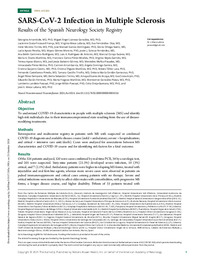Por favor, use este identificador para citar o enlazar este ítem:
https://hdl.handle.net/11000/33767Registro completo de metadatos
| Campo DC | Valor | Lengua/Idioma |
|---|---|---|
| dc.contributor.author | Arrambide, Georgina | - |
| dc.contributor.author | Llaneza-González, Miguel Ángel | - |
| dc.contributor.author | Costa-Frossard França, Lucienne | - |
| dc.contributor.author | Meca-Lallana, Virginia | - |
| dc.contributor.author | Fernández- Díaz, Eva | - |
| dc.contributor.author | Moreno Torres, Irene | - |
| dc.contributor.author | García-Domínguez, Jose Manuel | - |
| dc.contributor.author | Ortega Suero, Gloria | - |
| dc.contributor.author | Ayuso-Peralta, Lucia | - |
| dc.contributor.author | Gomez-Moreno, Mayra | - |
| dc.contributor.author | Sotoca-Fernández, Javier J. | - |
| dc.contributor.author | Caminero-Rodríguez, Ana Belén | - |
| dc.contributor.author | Rodríguez de Antonio, Luis A. | - |
| dc.contributor.author | Corujo-Suárez, Marcial | - |
| dc.contributor.author | Otano-Martínez, María A. | - |
| dc.contributor.author | Pérez-Miralles, Francisco Carlos | - |
| dc.contributor.author | Reyes-Garrido, Virginia | - |
| dc.contributor.author | Ayuso-Blanco, Teresa | - |
| dc.contributor.author | Balseiro-Gómez, José Jesús | - |
| dc.contributor.author | Muñoz Pasadas, Mercedes | - |
| dc.contributor.author | Pérez-Molina, Inmaculada | - |
| dc.contributor.author | Arnal-García, Carmen | - |
| dc.contributor.author | Domingo-Santos, Angela | - |
| dc.contributor.author | Guijarro-Castro, Cristina | - |
| dc.contributor.author | Íñiguez-Martínez, Cristina | - |
| dc.contributor.author | Téllez Lara, Nieves | - |
| dc.contributor.author | Castellanos Pinedo, Fernando | - |
| dc.contributor.author | Castillo-Trivino, Tamara | - |
| dc.contributor.author | Cerdán-Santacruz, Debora María | - |
| dc.contributor.author | Perez-Sempere, Angel | - |
| dc.contributor.author | Sebastián Torres, Berta | - |
| dc.contributor.author | Álvarez de Arcaya, Amaya | - |
| dc.contributor.author | Costa-Arpín, Eva | - |
| dc.contributor.author | Durán-Ferreras, Eduardo | - |
| dc.contributor.author | Fragoso-Martínez, Marta | - |
| dc.contributor.author | González Platas, Montserrat | - |
| dc.contributor.author | Landete, Lamberto | - |
| dc.contributor.author | Millán-Pascual, Jorge | - |
| dc.contributor.author | Oreja-Guevara, Celia | - |
| dc.contributor.author | MECA-LALLANA, JOSE EUSTASIO | - |
| dc.contributor.other | Departamentos de la UMH::Medicina Clínica | es_ES |
| dc.date.accessioned | 2024-11-04T10:30:08Z | - |
| dc.date.available | 2024-11-04T10:30:08Z | - |
| dc.date.created | 2021 | - |
| dc.identifier.citation | Neurol Neuroimmunol Neuroinflamm 2021;8:e1024 | es_ES |
| dc.identifier.issn | 2332-7812 | - |
| dc.identifier.uri | https://hdl.handle.net/11000/33767 | - |
| dc.description.abstract | Objective To understand COVID-19 characteristics in people with multiple sclerosis (MS) and identify high-risk individuals due to their immunocompromised state resulting from the use of diseasemodifying treatments. Methods Retrospective and multicenter registry in patients with MS with suspected or confirmed COVID-19 diagnosis and available disease course (mild = ambulatory; severe = hospitalization; and critical = intensive care unit/death). Cases were analyzed for associations between MS characteristics and COVID-19 course and for identifying risk factors for a fatal outcome. Results Of the 326 patients analyzed, 120 were cases confirmed by real-time PCR, 34 by a serologic test, and 205 were suspected. Sixty-nine patients (21.3%) developed severe infection, 10 (3%) critical, and 7 (2.1%) died. Ambulatory patients were higher in relapsing MS forms, treated with injectables and oral first-line agents, whereas more severe cases were observed in patients on pulsed immunosuppressors and critical cases among patients with no therapy. Severe and critical infections were more likely to affect older males with comorbidities, with progressive MS forms, a longer disease course, and higher disability. Fifteen of 33 patients treated with rituximab were hospitalized. Four deceased patients have progressive MS, 5 were not receiving MS therapy, and 2 were treated (natalizumab and rituximab). Multivariate analysis showed age (OR 1.09, 95% CI, 1.04–1.17) as the only independent risk factor for a fatal outcome. Conclusions This study has not demonstrated the presumed critical role of MS therapy in the course of COVID-19 but evidenced that people with MS with advanced age and disease, in progressive course, and those who are more disabled have a higher probability of severe and even fatal disease. | es_ES |
| dc.format | application/pdf | es_ES |
| dc.format.extent | 12 | es_ES |
| dc.language.iso | eng | es_ES |
| dc.publisher | Wolters Kluwer Health/Lippincott Williams & Wilkins | es_ES |
| dc.rights | info:eu-repo/semantics/openAccess | es_ES |
| dc.rights.uri | http://creativecommons.org/licenses/by-nc-nd/4.0/ | * |
| dc.subject | Esclerosis múltiple | es_ES |
| dc.subject | COVID-19 | es_ES |
| dc.subject.other | CDU::6 - Ciencias aplicadas::61 - Medicina | es_ES |
| dc.title | SARS-CoV-2 Infection in Multiple Sclerosis. Results of the Spanish Neurology Society Registry | es_ES |
| dc.type | info:eu-repo/semantics/article | es_ES |
| dc.relation.publisherversion | https://doi.org/10.1212/NXI.0000000000001024 | es_ES |

Ver/Abrir:
SARS-CoV-2 Infection in Multiple Sclerosis.pdf
290,55 kB
Adobe PDF
Compartir:
 La licencia se describe como: Atribución-NonComercial-NoDerivada 4.0 Internacional.
La licencia se describe como: Atribución-NonComercial-NoDerivada 4.0 Internacional.
.png)